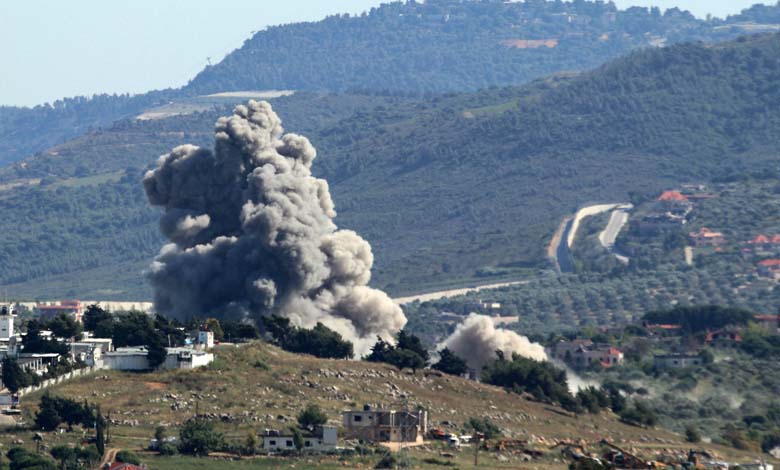The Limited Fangs of War: Will Israel’s Losses Lead to Escalation in Lebanon?

The killing of 8 Israeli soldiers in Lebanon yesterday raises questions about the depth and scope of Israel’s ground assault against Hezbollah and the possibility of it expanding into a full-scale invasion.
-
A $7 Million Bounty on Its Leader: What Is Hezbollah’s Most Dangerous Unit, “The Shadow Unit”?
-
Hezbollah Faces Two Choices After Nasrallah’s Assassination: Crushing Retaliation or Defeat
Experts believe that the large number of tanks and thousands of troops now gathered in the north indicate planning for a much larger invasion than what the Israeli army described as “limited, localized, and targeted raids” a few miles from the border, according to The Washington Post. As Netanyahu considers future moves, he will find himself having to deal with domestic calls for decisive military action in Lebanon and demands from right-wing hawks – including government members – to establish a more permanent “buffer zone” on Lebanese territory.
At the same time, the United States and other allies are trying to prevent Israel from launching a large-scale war amid concerns over regional conflict spillover and worsening humanitarian crises.
-
Gaza Setback and the Success of Israeli Spies: An Analysis of Hezbollah Infiltration
-
Israel Considers Ceasefire with Hezbollah While Continuing Escalation
Incursion into Lebanese Depths
Despite the Israeli army‘s insistence on not launching a full-scale invasion, it has also ordered residents of 30 villages in southern Lebanon to move north. In the orders sent to residents of these areas on Tuesday, the Israeli army urged them to relocate more than 30 miles from the border demarcation line.
Then on Wednesday, the Israel Defense Forces announced that infantry and armored units had joined the fighting, indicating that the army is preparing for a much larger ground campaign.
-
Can Hezbollah stand up to Israel? Iranian President expresses doubts
-
Israel Urges Lebanese Citizens to Immediately Move Away from Hezbollah Sites
Michael Horowitz, head of intelligence at risk consultancy Le Beck, said, “The Israeli Defense Forces and Israeli political leadership don’t want to get entangled in a prolonged operation that could strengthen Hezbollah, especially after it suffered several significant blows, but that’s easier said than done.”
Horowitz added that while the army wants to focus on the “frontline villages” about six miles from the border, there’s always a risk of combat widening.
-
The “gouged eyes” could have been avoided… Here’s what Hezbollah overlooked
-
Did Mossad Rig Hezbollah’s Communication Devices in Taiwan?
There is a historical precedent for mission expansion in southern Lebanon. The first time Israel invaded in 1978, in an attempt to destroy bases established by Palestinian militants, the Israeli army initially aimed to occupy 6 miles of territory. But after three days, it decided to advance to the Litani River and did not withdraw until 22 years later.
Buffer Zone
Horowitz believes that creating an Israeli buffer zone within Lebanese borders would expose its forces to risk and serve as a “gift” to the armed group. However, over time, pressure within Israel to establish such a zone will increase.
-
The “Empire” of Smuggling and Gold: Why Lebanon Grows Poorer While Hezbollah Becomes Wealthier
-
Hezbollah’s Response to Chokr’s Assassination Eased Tensions
Calls for a buffer zone are already coming from the far right in Israel. Israeli right-wing Diaspora Minister Amichai Chikli wrote a post on X, stating, “Creating a buffer zone free of enemy inhabitants is the need of the hour, and it is the most just thing from a security, political, and moral perspective.” He also shared several maps showing what he described as “new borders” within Lebanese territory.
Last week, Itamar Ben Gvir, Israeli National Security Minister, threatened to leave the government if Netanyahu agreed to a ceasefire in Lebanon, repeating a threat he had previously made regarding negotiations with Hamas.
-
What Weapons Will Hezbollah Use in an Open War with Israel?
-
Washington Post reveals how Lebanese pay the price for Iranian threats and ongoing Hezbollah-Israel clashes
Eyal Zisser, a Middle East expert at Tel Aviv University, said many Israelis doubt the operation will force Hezbollah to agree to Israeli terms.
Israel is no stranger to occupying land in Lebanon. In 1982, Israel launched a second invasion of Lebanon, reaching the capital, Beirut, before retreating three years later to an expanded “security zone” along the border, ranging from three to 12 miles and covering about 10% of Lebanese territory.
-
Hezbollah Bets on Tunnel Warfare in Confrontation with Israel
-
Can Israel Deter Hezbollah? Dark Scenarios for a Potential Confrontation
However, this plan is not supported by everyone in Israel. Efraim Sneh, former Israeli Defense Minister and commander of Israeli forces in the “security zone” in southern Lebanon in the early 1980s, believes Israel could instead impose this zone through “a very strict Israeli policy” targeting anyone entering the designated area.
Sneh added that it would be better to deploy an effective Lebanese or international force on the ground to prevent Hezbollah from rebuilding its military capabilities.












